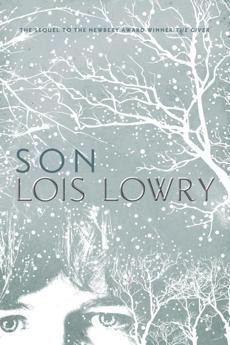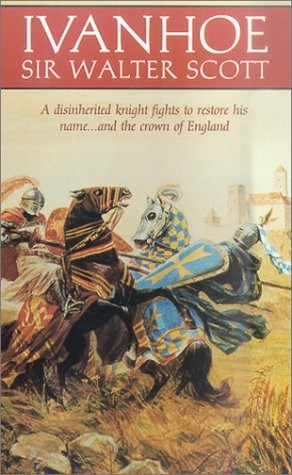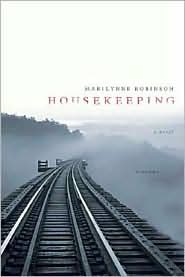Son
 Having read all four books now in Lois Lowry’s Giver quartet, I find myself looking back and thinking about the big picture. For the most part, though I enjoyed the reading experience of the concluding book Son, I feel like Lowry would have done just as well to stop after The Giver.
Having read all four books now in Lois Lowry’s Giver quartet, I find myself looking back and thinking about the big picture. For the most part, though I enjoyed the reading experience of the concluding book Son, I feel like Lowry would have done just as well to stop after The Giver.
Son returns to the scene of The Giver from a different perspective, that of Claire, mother to the baby with whom Jonas escapes from his restrictive futuristic community. We learn Claire’s story, which makes for interesting enough reading, and the book appears to be an attempt to tie up some of the loose ends still left after all three previous books.
But it leaves me scratching my head. Many of the twists and turns of Claire’s story seem like dead ends; the book is divided into three sections that simply read like three separate stories. Characters are introduced in ways that suggest they will be significant (Tall Andras, for instance, or the young man on the ship), then abandoned without amounting to anything related to the central plot. The ending is altogether too abrupt — as though Lowry had lost interest in her own story and simply wanted to quit writing. And finally, though the sinister Trademaster returns in this story, it’s hard to understand what’s so important about him, or what his fate in this story really accomplishes — other than to restore beauty to one character.
(That paragraph is probably totally unsatisfactory to anyone who hasn’t read the book, but I don’t want to dish up too many spoilers, so I’m going to let it stand…)
So why did I say it was enjoyable to read? There was more description of setting, and a larger cast of characters, and at times Lowry’s writing verged on the poetic. I didn’t find this to be the case in the other stories, which were more minimal and more about the plot than the full development of character or setting. I suppose this is why Son is a notably longer book than the others. But though there were aspects I enjoyed, it doesn’t leave me with much to chew on and certainly doesn’t beckon me to reread it sometime. My overall impression is that this is a series with a dynamite opening book and three anticlimactic successors. They all give us things to think about, but none of them rise to the level of the first book.
The Giver is the book that stays in mind, and the strength of Son is in its return to that setting: a world in which people have willingly sacrificed freedom and feeling; where love is considered a dangerous risk; where familial attachment — any human attachment — is subversive; where an autocratic central authority totally controls people’s fate; and where language is completely gutted and detached from its power; this is a world that invokes some meaty questions about society, government, relationships, and what really matters.
It’s interesting to me that all four books involve a search for parental connection. I’ve heard it said that if you want to write a book for young people, the first thing you have to do is kill off the parents in the story, so that the protagonist is acting alone. But these stories depict protagonists searching a drab world for a restored parent-child relationship. In the world of The Giver, this connection has been intentionally destroyed. It’s worth considering in what way this pervasive sense of disconnection and longing reflects something real and deep for today’s young readers.
Here are links to my reviews of the other three books: The Giver, Gathering Blue, and Messenger.



4 Comments
Ruth
I haven’t read this one yet, but my daughter didn’t like it at all. She said it took all the ambiguity of The Giver away, and the ambiguity was one of the aspects she loved most about that book. I agree with you that The Giver is the best book of the series, though so far I’ve only read three of them. I’m not that motivated to read Son!
Janet
Good point about the ambiguity being ruined.
I wondered what happened to Jonas after The Giver, but I definitely didn’t need so much detail to satisfy my curiosity. And I liked the way being left hanging made us ask whether he was better off for leaving, even if he didn’t survive it.
Sherry
Yup. I haven’t read Son, and I enjoyed the second and third books well enough, but The Giver is the best. I wonder how much pressure (from the publisher, from the public) there is for the author of a best-selling fantasy or science fiction book to follow up with sequels?
Janet
Good question… Now you have me trying to remember series where the sequels are as good as the first book!
Narnia. Prydain. It’s been a long time since I read them, but I remember really liking A Wrinkle In Time and its sequels. I thought all three Hunger Games books were pretty good. The Princess and the Goblin, the Princess and Curdie. C.S. Lewis’ space trilogy.
I really liked Ender’s Game but I never could read any of the others. Mysterious Benedict Society books… I thought the first was best. The others were good but the cruelty of the Ten Men seemed to be dwelt on too much…
What series do others think of?